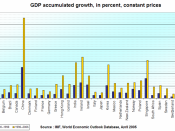In the past few decades the controversial topic of globalisation has become a dominant economic, political and social issue. The concept of Globalisation can be defined as the process of all the individual states, cultures, religions and especially economies coming together to form one single entity. Economic globalization which is the spread and integration of markets, corporations and trade into foreign areas is probably the most popular and widely debated aspect of globalization. The way it has been changing the world's economy has lead to some major advantages and disadvantages. Those who support globalisation say that it brings the first real chance of prosperity to the impoverished corners of the world. Opponents, on the contrary, say that globalisation is the cause of growing poverty and inequality on the planet. In this essay some of the positive sides of the process will be presented and analysed. Globalisation affects the world and mainly its economy in certain positive ways, that is: it increases the development of global prosperity, it brings about the decrease in the impoverishment of the 'Third World' countries, and it promotes the development and spreading of technology and knowledge all over the world.
To begin with, globalisation increases global prosperity and organisational efforts to stabilise the world economy. By historical standards global poverty has decreased more in the last 50 years than in the past 500, and the welfare of people in almost all regions has improved significantly over the past few decades. Although there are still numerous instances in African and Asian counties of people living in poor conditions lacking proper food, water and medical care, there is strong evidence that inequalities in global income and poverty are decreasing. Liberalisation of trade i.e. removing trade barriers, promoting privatisation, and reducing taxes, has had a positive impact on the...


